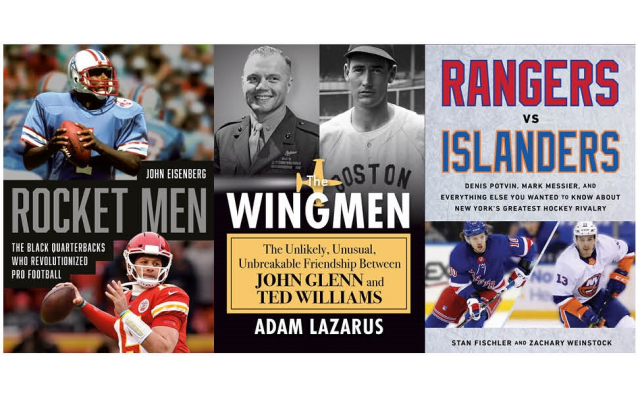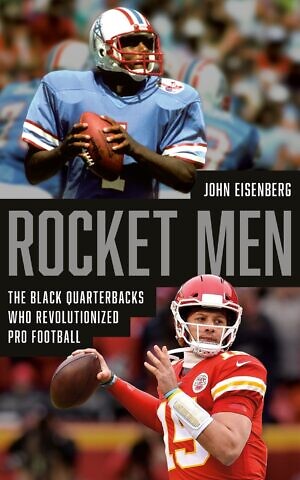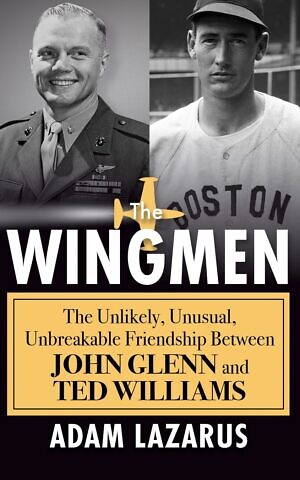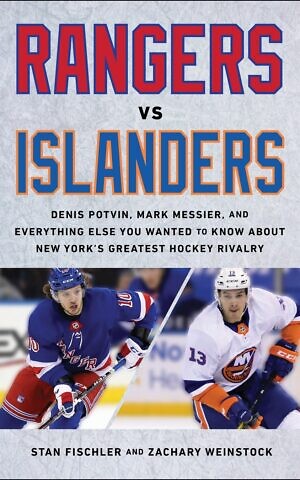Top Sports Books by Jewish Authors
The AJT sportswriter recommends some of his favorite sports books to make great gifts this Chanukah.

Rocket Men by John Eisenberg
In the modern-day NFL, nearly half of starting quarterbacks are Black, including those in last year’s Super Bowl, Patrick Mahomes and Jalen Hurts of the Kansas City Chiefs and Philadelphia Eagles, respectively. But as esteemed sports author and former Baltimore Sun sports columnist John Eisenberg demonstrates in “Rocket Men: The Black Quarterbacks Who Revolutionized Pro Football,” this is a relatively new development, one that really didn’t begin in earnest until the very end of last century.

Indeed, throughout much of the sport’s history, NFL teams were loath to draft Black quarterbacks, clinging to the hideous, racist stereotype that, by virtue of their skin color, they were not suited to lead teams into battle. (Interestingly, one notable exception was John McKay, the father of Atlanta Falcons CEO Rich McKay, who as Tampa Bay Buccaneers head coach in the 1970s had a very progressive mindset.) In fact, it wasn’t until the late 1990s/early 2000s that there was a sea change when a new wave of dual-threat quarterbacks, headlined by Donovan McNabb and Michael Vick, entered the league, became embedded in American mainstream pop culture, (although in Vick’s case that, of course, was short-lived) and forever changed the dynamic of the game’s most critical position.
And yet, as Eisenberg reasons, for all the tremendous gains made by Black quarterbacks over the past few decades, which can largely be attributed to trailblazing QBs Warren Moon (first Black quarterback to be elected to the Pro Football Hall of Fame) and Doug Williams (first Black quarterback to start and win a Super Bowl), subtle forms of discrimination still linger. Earlier this century, many Black quarterbacks getting recruited by top tier college programs, such as Atlanta native and eventual NFL MVP Cam Newton, were encouraged to slide over to wide receiver or running back. Curiously, the Chicago Bears in 2017 drafted a far less accomplished white quarterback, Mitchell Trubisky, now a veritable NFL journeyman, over the future Hall of Famer Mahomes. Even now, in the mid-2020s, there are relatively few Black players who are backup quarterbacks – a position that is often viewed as an extension of the coaching staff.
“Rocket Men” is not only an evergreen sports history book that is particularly relevant to this NFL season with Houston Texans rookie quarterback C.J. Stroud taking the league by storm; its embedded narrative is, in many respects, a vivid illustration of how the civil rights movement carried over to the athletic fields.
The Wingmen by Adam Lazarus
When Ben Bradlee, Jr. came out with his 864-page biography of Ted Williams (“The Kid: The Immortal Life of Ted Williams”) a decade ago, it was expected that the tome would be the final word on the man widely considered the greatest hitter who ever lived. However, readers of Adam Lazarus’s fantastic new work, “The Wingmen: The Unlikely, Unusual, Unbreakable Friendship Between John Glenn and Ted Williams,” will be thankful it wasn’t.

Lazarus, an Atlanta-area resident who recently presented at the Book Festival of the MJCCA, offers a fresh perspective on Williams’s heroic yet nevertheless complex life by deftly tracing the arc of Teddy Ballgame’s decades-long friendship with Glenn that was forged when both men were serving America in the Korean War. In a considerably more succinct manner than that of Bradlee, Jr.’s best-seller, “The Wingmen” brings to life a comradeship steeped in irony: on the one hand, there’s Williams, the Hall of Fame ballplayer, a notorious womanizer often perceived as gruff and short-tempered, who adamantly remained a dyed-in-the wool Republican; and then Glenn, the war hero/astronaut/Democrat senator whose wholesome values included marital fidelity and a refrain from cussing. And as the first half of the book, grounded in seemingly exhaustive military research, chronicles the genesis of the Williams-Glenn friendship in the brutal, arctic conditions of war-torn Korea, it is quite evident that the two titans of 20th century American history had very different perspectives on serving their country. Without divulging too much of a key plotline, Williams, who nearly died during a crash landing in Korea, was not exactly gung-ho about sacrificing more years of big-league stardom for another tour of duty following his time overseas in World War II.
Although Lazarus’s isn’t the first Ted Williams book to bring to light the storied slugger’s dark side, the veteran sports author, who has penned stories for the Atlanta Journal-Constitution among other publications, doesn’t shy away from detailing some uncomfortable truths. Just as Williams was a tireless champion of the Jimmy Fund’s efforts supporting young cancer patients, so too was he known as an absentee father whose professional career was tainted by an acrimonious relationship with the Boston media and acts of hostility toward Red Sox fans.
Meanwhile, the juxtaposition of Williams’s and Glenn’s life stories illustrates a fascinating dynamic that further complicates Williams’s legacy: even though he was a devout supporter of the civil rights movement – as well as the plight of former Negro League stars to earn their due recognition – Williams never budged on his hardcore Republican values, ultimately refusing to support his former wingman in his later-in-life political career. Such irony only adds more intrigue to the already compelling storyline of an enduring friendship between two American folk heroes, who were in many ways polar opposites.
Toward the end of “The Wingmen,” a finalist for the Casey Award, given to the year’s best baseball book, Lazarus quotes John Glenn as saying, “When you fly in combat with somebody, there’s a bond that runs so deep you cannot describe it.”
Perhaps true, but Adam Lazarus nevertheless does one heck of a job chronicling it.
Rangers vs. Islanders by Stan Fischler and Zachary Weinstock
Long considered America’s foremost hockey historian, Stan Fischler has devoted his entire professional life toward chronicling the wintry sport, initially as a publicist for the New York Rangers as a recent college grad in 1954 before turning to writing and broadcasting. These days, the 91-year-old New Yorker still serves as the resident hockey expert for MSG Networks. He’s also a rather prolific hockey author, having written over 90 books on the sport, including “Rangers vs. Islanders,” which he co-authored with Zachary Weinstock, an accomplished hockey writer in his own right.

Originally published in 2016 but later updated in a new edition two years ago, “Rangers vs. Islanders” is a fun journey through a half-century-long Big Apple rivalry that has pitted two now championship-starved fan bases against one another. The Islanders last won a Stanley Cup in 1983, the apex of their dynastic 1980s run, while the Rangers haven’t hoisted the Cup since 1994. Through the years, as Fischler and Weinstock illustrate, the bad blood and frustration would manifest itself in fracases throughout Madison Square Garden and Nassau Veterans Memorial Coliseum, often requiring a heightened security presence to subdue.
While Fischler and his co-author Weinstock go into detail chronicling the classic Rangers-Islanders matchups through the years, the rivalry’s leading characters are brought to life. The stories of Denis Potvin, Mark Messier, Mike Bossy, Mike Richter, Mike Keenan, Al Arbour, and so many others are all chronicled. There’s also a fairly lengthy section on Adam Fox, the gifted New York Rangers defenseman who has a chance to become the most accomplished Jewish hockey player of all time. For the purposes of this book, it is notably ironic how Fox grew up on Long Island not far from Nassau Coliseum, but now stars for the Islanders’ Manhattan-based rival, of whom he was a diehard fan in childhood.
Ultimately, after reading “Rangers vs. Islanders,” hockey fans will understand why the New York Islanders unveiled the Stan Fischler Press Level at their sparkling new home of UBS Arena last year.



comments